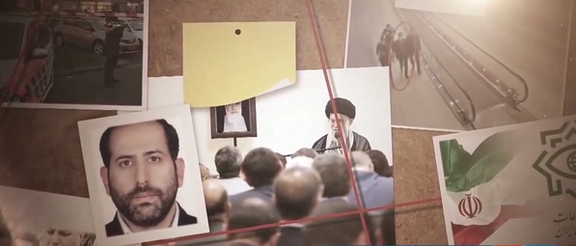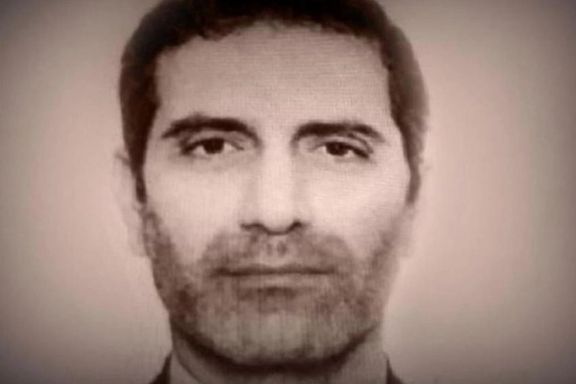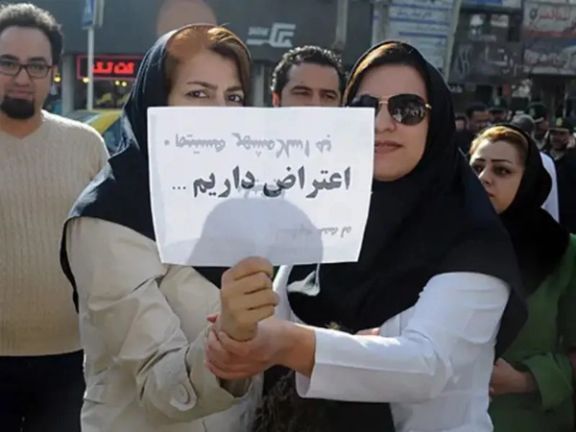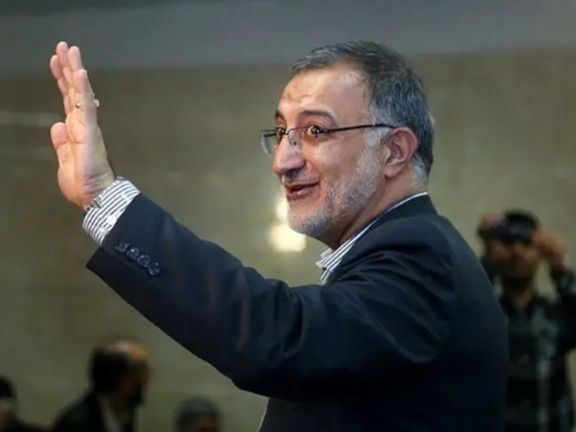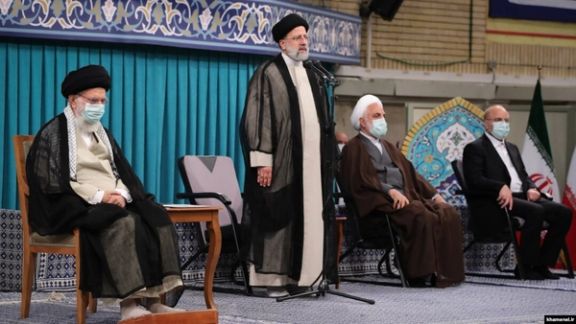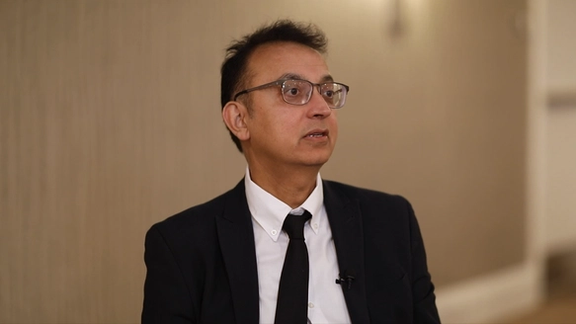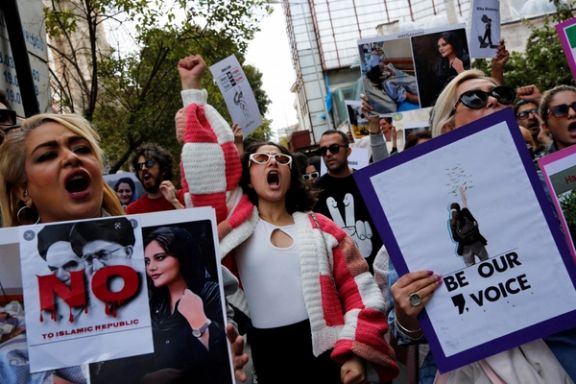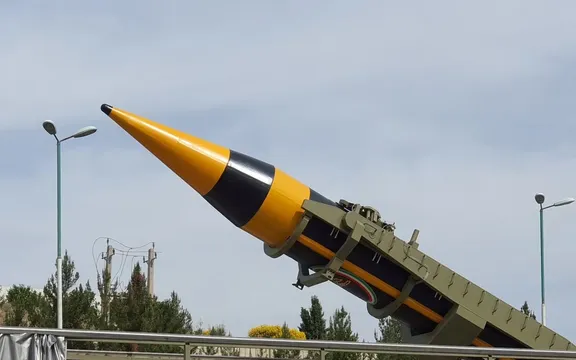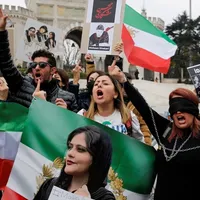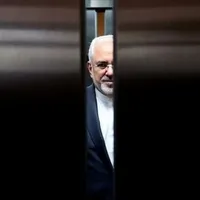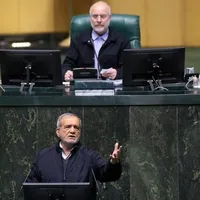Protests erupted in numerous global cities, including Bern, Amsterdam, Melbourne, Oslo, The Hague, Vienna, Stockholm, Manchester, Auckland, Sydney, Washington, and Hamburg, as demonstrators called to boycott the polls.
Meanwhile, clashes were reported between voters and protesters, with some arrests reported in London and at least four recorded on camera. The Metropolitan Police did not respond to Iran International’s request for comment.
The confrontations highlighted the divide even within the diaspora where voters and boycotters came face to face.
In London, outside the Iranian consulate where voting for Iran's presidential election was underway on Friday, protesters confronted voters, questioning their decision to participate after the government's bloody repression of the 2022 nationwide protests in Iran.
"How can you vote after all these people were killed? You legitimize the regime by doing so," one protester was heard shouting in a video shared on social media.
In another video, one voter is seen making a death gesture at protesters.
A notable incident, capturing even the attention of Iranian media, involved a female protester filming herself as she pulled off the hijab of one of the voters, igniting considerable controversy.
Two videos surfaced showing voters being arrested by the Metropolitan Police, along with one protester being detained for swearing as confrontations became physical.
But, this incident is not isolated. In May, during the commemoration of Ebrahim Raisi's death in a freak helicopter crash, clashes erupted between Islamic Republic loyalists and dissidents in both London and Maryland.
In the United States, a court issued a temporary restraining order against an employee of Iran's Interests Section in Washington, DC, who was seen threatening Iranian protesters with death.
Meanwhile, in London, images of an Iranian woman being beaten to the ground by a man seemingly loyal to the Islamic government went viral on social media. Additionally, an Iranian protester sustained injuries following an attack during the clashes.
"Any form of physical abuse or violation of someone's personal space is entirely unacceptable. Freedom of religion is a fundamental right, and violence in any context cannot be justified," remarked Arash Joudaki, a researcher and holder of a doctorate in Philosophy, in an interview with Iran International.
Explaining the venting of frustrations of the protesters, Joudaki said, “Swearing is a convenient outlet for expressing anger. Some argue that if certain people gain power, they will commit atrocities, equating their swearing to murderous intent. However, this comparison is flawed. Hitler did not swear; he orchestrated mass murder. Verbal abuse and killing are not directly related.
“Supporting an authoritarian regime through your vote means accepting the consequences, including receiving verbal backlash. Swearing pales in comparison to the regime's atrocities, such as the shooting of protesters during nationwide demonstrations."
Sociologist Hossein Ghazian saw the recent incident as a sign of Iranian society's anger. “Our anger manifests in two ways: Through words, which becomes ‘verbal aggression,’ meaning angry verbal behavior, and through actions, which becomes ‘violence,’ meaning angry physical behavior.”
“People swear to hurt and harm the recipient of the curse,” Ghazian said. He believes opponents of the Islamic Republic use such language against their adversaries because they have taken on its characteristics and are influenced by it during their fight, whether in mindset, language, or behavior.
Ghazian views swearing as a "political act" with both advantages and drawbacks.
“It has its benefits, for instance, when it is directed at the Supreme Leader and his inner circle” because it breaks the sacredness or untouchability of the Supreme Leader, but in contrast, if it’s aimed at security forces or the supporters of the Islamic Republic it ultimately proves counterproductive.
“Imagine a Revolutionary Guard involved in oppression all day returning home to a family upset by his actions, possibly scolding or advising him to stop. However, if the family, especially the mother, has heard the protesters' curses targeting them, she is less likely to be upset about his involvement in repressing those who insulted them. She might not encourage further repression, but she will be less upset,” Ghazian wrote.
Moral and tactical considerations
This is precisely the issue that social scientist Erfan Sabeti cautions against, arguing that swearing is both tactically and morally detrimental.
Sabeti, an editorial board member of Nashr Aasoo, told Iran International that swearing and vitriolic language, even when directed solely at the Supreme Leader, is morally problematic because it transforms us into the very thing we strive to oppose. This behavior does not merely remain an isolated act of defiance against an oppressive figure; instead, it insidiously embeds itself into our conduct and psyche. By adopting the methods and temperament of our adversaries, we risk becoming reflections of them, perpetuating a cycle of hatred and aggression.
Sabeti thinks that when we resort to swearing, we engage in a form of verbal violence that mirrors the moral degradation we condemn in our opponents. Though this kind of rhetoric may seem like a harmless venting of frustration, it fundamentally undermines the ethical high ground we seek to maintain.
“The Islamic Revolution was founded on violence, and its results reflect that foundation. Violence is destructive, not constructive. While one might overcome an opponent through violence, it leaves behind ruin. If we aim to eliminate oppression and repression, we must not let hatred accumulate within us, despite the government's extensive violence making it very difficult,” Sabeti told Iran International.
Striving for ethical integrity
According to Sabeti, actual change, both political and social, requires that we uphold the values of respect, empathy, and ethical integrity, resisting the temptation to mirror the malice of our adversaries. Only by doing so can we hope to create a future that transcends the cycles of violence and retribution that have marred our past.
Another danger of this behavior is that the Islamic Republic propaganda machine exploits this by suggesting that if these people come to power, they will destroy everything and be even worse than us.
This assertion has been substantiated as Iran’s Interior Minister last week denounced the Iranian diaspora protesting outside consulate buildings and polling stations on presidential election day, branding them as "terrorists" residing in the West.
Also, another is that it is not just to curse Khamenei; we become accustomed to it, it normalizes, and its disgrace fades, according to Sabeti.
Internal opposition disputes mirror this behavior, spreading rudeness within. This can be seen on social media, as opposition supporters sometimes engage in that behavior.
The complex dynamics of the diaspora
Ghazian posits that the dynamics between the diaspora and the people inside Iran are complex, with the actions of dissidents abroad having both positive and negative effects. He believes that the sizable Iranian diaspora now holds significant electoral weight, which can influence local politicians. However, their actions are heavily scrutinized and depicted in the media.
This scrutiny can reinforce the belief among Iranians within the country that the diaspora wields more power than it actually does. While this perception might provide some comfort to dissidents inside Iran, it also poses a danger. Ghazian argues that many Iranians hold the belief that Western powers, being responsible for the Islamic Revolution, can remove it. This can lead to an overestimation of the diaspora's power. Consequently, when it becomes apparent that the diaspora alone cannot bring about change, people may become disillusioned and lose hope.
There have been two significant occasions when the diaspora engaged in substantial protests in recent years. On October 22, 2022, over 80,000 people gathered in Berlin, according to German police reports. Protesters demanded the closure of Iranian embassies worldwide. Despite the Berlin demonstration revealing an intellectual imbalance within the Iranian diaspora, as evidenced by the disproportionate nature and diversity of the participants compared to the organizing group and the speeches delivered, it garnered significant international attention.
On January 16, 2023, a gathering of 12,000 people took place in Strasbourg, France, in front of the European Parliament. Iranian protesters aimed to have the European Union declare the Iranian Revolutionary Guard Corps (IRGC) a terrorist organization.
Sabeti contends that the Iranian diaspora wields considerable influence. However, there has been a historically strained relationship between dissidents inside and outside the country, which is not solely an issue confined to Iranians.
Those within Iran often argue that, having escaped the "cage," the diaspora is not in a position to dictate their methods of resistance. Conversely, those abroad frequently believe they possess a superior understanding of the situation from their vantage point. Sabeti believes that, in reality, each group perceives only a portion of the broader picture, and effective collaboration between them is essential.
Two misguided reactions to the Islamic Republic
Sabeti believes there are two misguided reactions to the Islamic Republic. “One approach is to resort to dissimulation, a practice that has persisted among us for centuries. This involves playing a role and becoming two-faced, thinking one can deceive the ruling regime.”
“However, the regime is aware of this pretense and is content with it, as the entire totalitarian system is based on appearances and lies. This is also true for participating in elections, which are merely for show and not genuine,” Sabeti added.
The other path is violence—harboring thoughts of revenge and adopting the rulers' behaviors. “Following their actions means believing that the ends justify the means, but this changes one's very nature.”
Strategies for effective support
Sabeti believes that these strategies could enable the diaspora to support the people within the country from abroad effectively:
- Building Organizations: Establish enduring institutions that focus on education, research, and various methods of resistance.
- Organizing Protests: Arrange protests in strategic locations, such as in front of embassies, while avoiding swearing and maintaining a respectful tone.
- Raising Awareness: Inform and engage with the civil society in their host countries to raise awareness about the issues. Educate Western voters on these matters since politicians tend to respond to the concerns of their electorate.
- Supporting Workers' Strikes: Provide financial support for nationwide workers' strikes by creating and contributing to support funds. These funds can help sustain striking workers, ensuring they can continue their protests without facing immediate financial hardship. This form of support not only bolsters the morale and resilience of workers but also amplifies their collective bargaining power against the ruling establishment.
